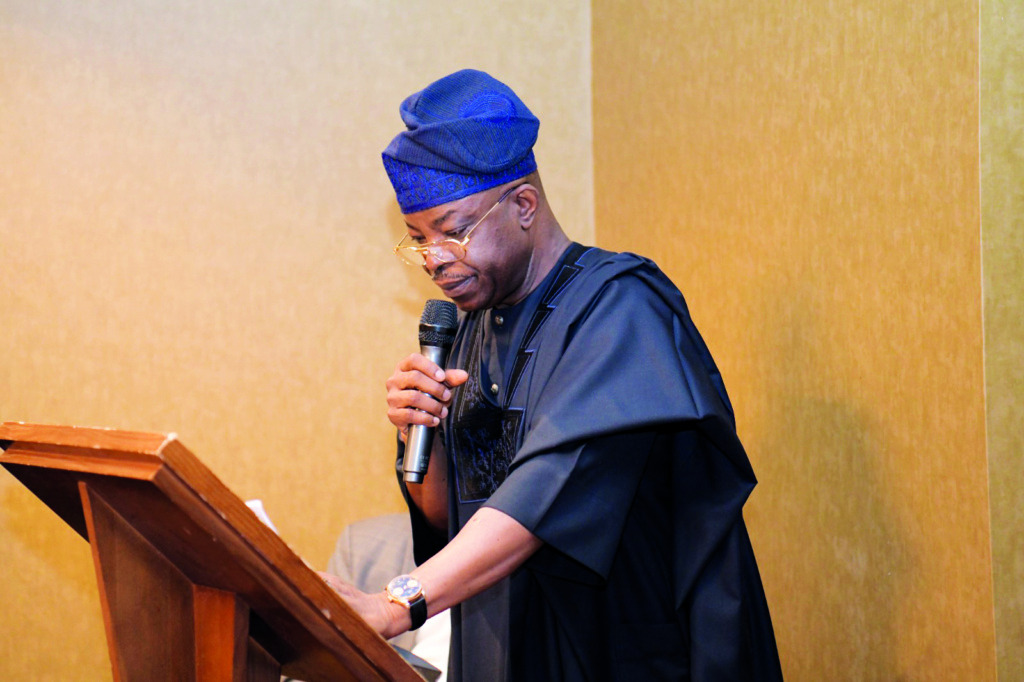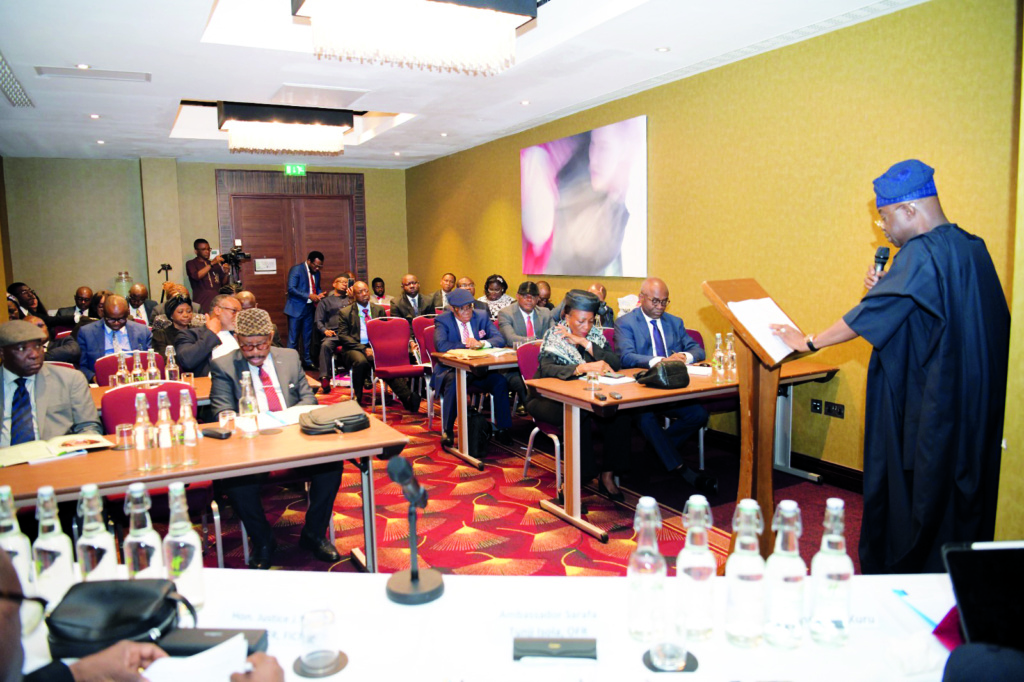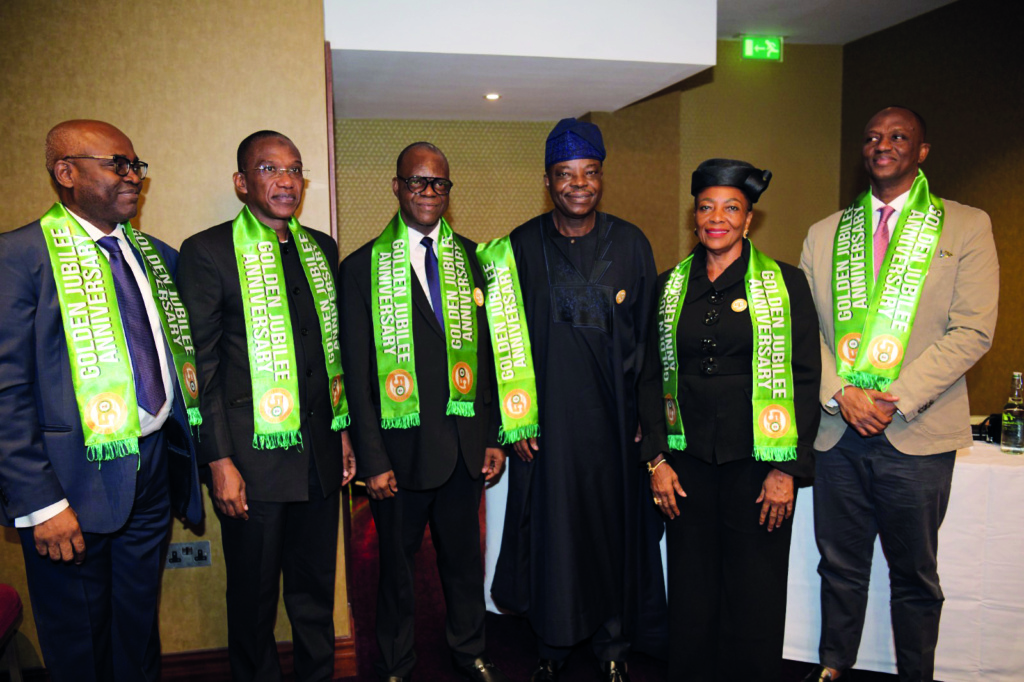
By Milton Tella – His Excellency, Ambassador Sarafa Tunji Isola OFR, High Commissioner for Nigeria in the UK in his address to declare open the training of the Nigerian Federal High Court Judges, in London on Monday 31 July 2023 recommended the use of technology in the 21st century adjudication in Nigeria.
Ambassador Isola said, the fact that in the judicial sector, across the globe, emerging technologies have enhanced speedy delivery of justice in legal matters, he therefore recommend the use of technology in justice delivery for Nigerian Judges.

His Excellency made the recommendation while delivering his speech titled: “The Role Of Technology In The 21st Century Adjudication And The Place Of The Federal High Court In The Integrity Of Conventional And Virtual Economy”. He said, there is a need for the Court to embrace technology in justice delivery. “E-filings of the court process and online service should be encouraged. Moreso, the Court should take advantage of video conferencing apps or it can develop custom software for virtual sittings. This will eliminate unnecessary adjournments due to absence of witnesses.
“In addition, smart court recorders will lessen the burden of judges who have to take proceedings in longhand. The world is a more technological advanced arena and the Court should not be left out especially as businesses are increasingly done online”.
Ambassador Isola added that there was a need to constantly equip judicial officers with the requisite skills for effective adjudication, especially in the digitized world, where the rate of technology development is fast ahead of laws.
He further said, “An effective justice system ensures contract enforcement, which is the basis of market transactions. A well-functioning judicial system is indispensable to business activities and to the society as a whole, hence Judicial efficiency is measured by trial length.
Judicial efficiency is closely associated with accessibility to judicial services and the certainty of an efficient judicial system raises people’s confidence. Certainly, one of the factors that discourages investment, particularly foreign investment, in developing countries is the absence of an effective and reliable dispute resolution mechanism”.
To reposition the Courts, especially the Federal High Court as the catalysts for economic growth in Nigeria, I hasten to recommend that the relevant judicial authorities should consider robust and holistic amendments be carried out on the rules of procedure for various courts in order to isolate outdated rules that undermine the efficient delivery of justice and the delay of court proceedings. The Court should prescribe a regime that aligns the theme of this Program in that direction because such mechanism has already been adopted by most developed and some of the developing nations. It is also very critical that credibility, competence and integrity should play a decisive role in the appointment, and discipline of the Court officials.
My Lord, the leadership of the judiciary should champion the amendments of our Constitution to discourage the tardiness in proceedings pursuant to unnecessary interlocutory applications. Additionally, it is essential that the manpower of the judiciary is proportionate or at least optimal to the density of cases in its dockets.
Another important recommendation is the need to curb the filing of frivolous cases, which takes judicial time. It is a well-known fact that the number of judges on the bench of the Federal High Court is saddled with too many cases on their dockets some of which are frivolous. There has to be effective strategies to eliminate this practice such as levying punitive costs on litigants and their counsel for filing such cases. These costs will serve as a deterrent to future litigants.
There is also a need for the Court to embrace technology in justice delivery. E-filings of court processes and online service should be encouraged. Moreso, the Court should take advantage of video conferencing apps or it can develop a custom software for virtual sittings. This will eliminate unnecessary adjournments due to absence of witnesses.
In addition, smart court recorders will lessen the burden of judges who have to take proceedings in longhand. The world is a more technological advanced arena and the Court should not be left out especially as businesses are increasingly done online.
These recommendations towards the reformation and transformation of the Nigerian judiciary may be endless. Nonetheless, it is advisable that this distinguished Court considers adopting judicial emergencies where appointment of new Judges is triggered once the threshold of permitted cases is exceeded by the Court.
The foregoing fundamental recommendations may not be realized in the absence of massive human & infrastructural investment in the Court system. The Federal High Court should therefore collaborate with the National Judicial Institute to jointly re-invigorate the capacity development of judicial officers whilst the Alternative Dispute Resolution should also be developed through the relevant amendments to the Arbitration and Conciliation Act.
Fortunately, I am highly hopeful of reforms in the judiciary championed by President Ahmed Bola Tinubu. His antecedents when he was the governor of Lagos State leaves no doubt that the present administration will take giant steps by cooperating with the leadership of the judiciary so as to achieve positive results that will lead to effective performance of our Courts.”
Kindly follow us on twitter:@AfricanVoice2










